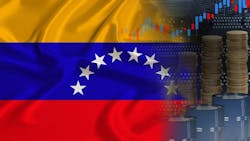-
Revocation of Chevron's license: Pres. Trump revoked Chevron's license to extract and export oil from Venezuela, citing Caracas' failure to quickly transport deported criminals.
-
Sanctions, licenses: The US has sanctioned Venezuela for over 15 years. In 2022, Pres. Biden allowed Chevron to operate joint ventures with state-owned PDVSA despite sanctions. In April 2023, Biden reimposed sanctions due to lack of election reforms.
-
Venezuela oil reserves, production: Despite holding large proven crude oil reserves, Venezuela's oil production has been on the decline, producing only 742,000 b/d in 2024.
US President Donald Trump will revoke a license that allowed Chevron to extract and export a limited amount of oil and oil products from Venezuela to the US, the US Treasury Department said Mar. 2.
“Treasury is preparing to take action to wind-down General License 41 and other specific licenses as appropriate,” the Office of Foreign Asset Control (OFAC) said in a brief statement, adding that it would issue additional guidance on implementation.
Trump made the announcement on Truth Social Feb. 28, writing that Caracas had not transported "violent criminals" deported from the US quickly enough.
The revoked license could drive down production, exacerbating Venezuela’s decade-long economic woes. Chevron exports about 240,000 b/d of crude from its Venezuelan operations. If Venezuela's state oil company Petroleos de Venezuela SA (PDVSA) were to take over those exports, US refineries could not purchase the oil because of US sanctions.
The US has levied sanctions on Venezuela for more than 15 years. In 2019, President Trump issued an executive order to sanction foreign energy companies working with PDVSA after Maduro’s reelection victory, which US and other Western governments rejected as fraudulent.
The Biden administration in 2022 issued the license permitting Chevron to operate joint ventures with PDVSA despite the sanctions. The license barred the US oil major from paying taxes or royalties to the Venezuelan government (OGJ Online, Dec. 5, 2022).
While Biden suspended sanctions on exports of Venezuelan oil and investments in the country’s oil and gas sector in November 2023, he reimposed them in April 2023, citing Caracas’ lack of progress in meeting election-reform commitments (OGJ Online, Nov. 6, 2023).
The Chevron license stayed in place, along with US authorizations granted to several other foreign oil companies. The White House and Treasury did not specify whether the other authorizations would remain.
While Venezuela had the world’s largest proven crude oil reserves in 2023, with about 303 billion bbl, it only produced 742,00 b/d last year, 70% less than in 2013, according to the US Energy Information Administration (EIA). In 2001, the US alone imported 1.3 million b/d from Venezuela, according to EIA.
About the Author
Cathy Landry
Washington Correspondent
Cathy Landry has worked over 20 years as a journalist, including 17 years as an energy reporter with Platts News Service (now S&P Global) in Washington and London.
She has served as a wire-service reporter, general news and sports reporter for local newspapers and a feature writer for association and company publications.
Cathy has deep public policy experience, having worked 15 years in Washington energy circles.
She earned a master’s degree in government from The Johns Hopkins University and studied newspaper journalism and psychology at Syracuse University.
